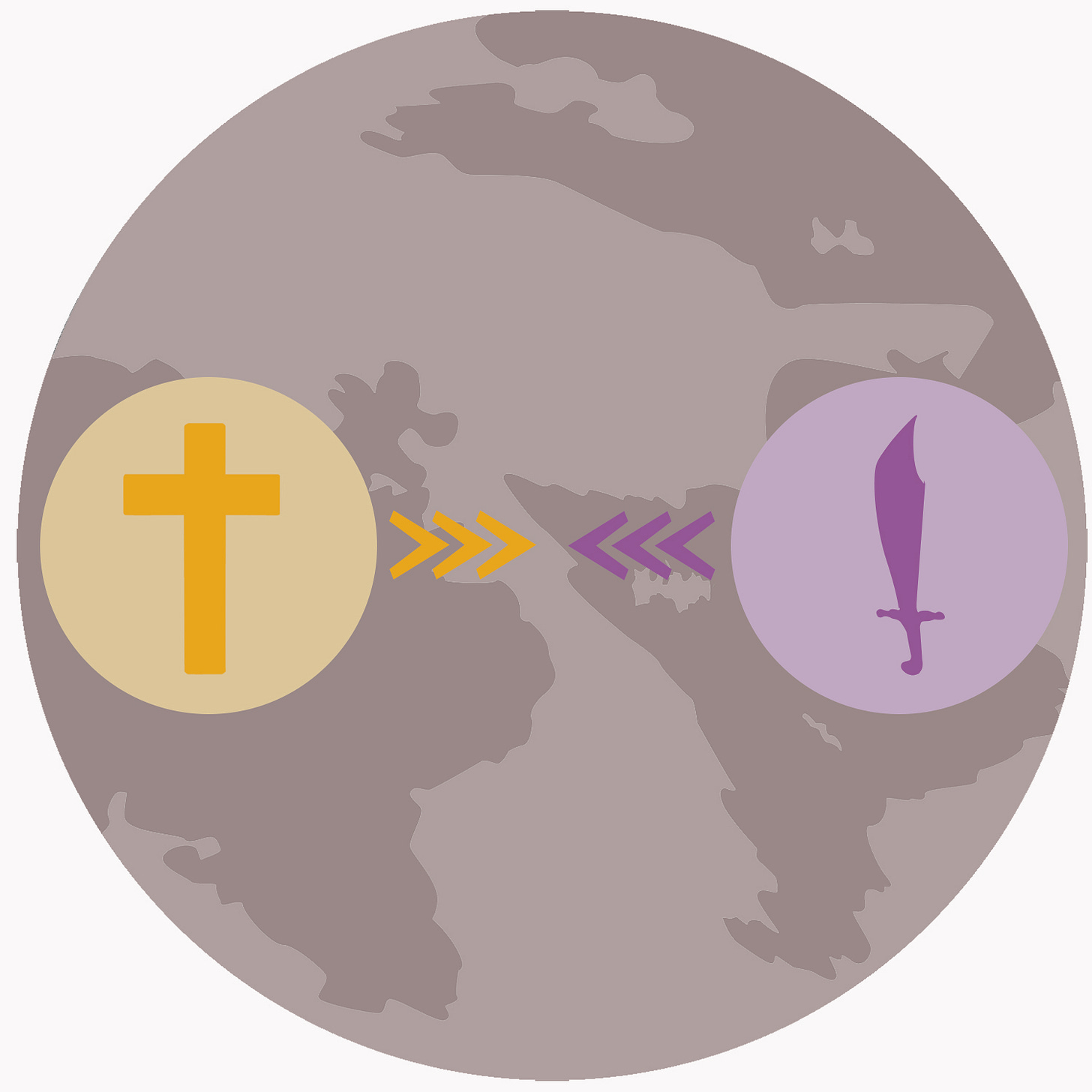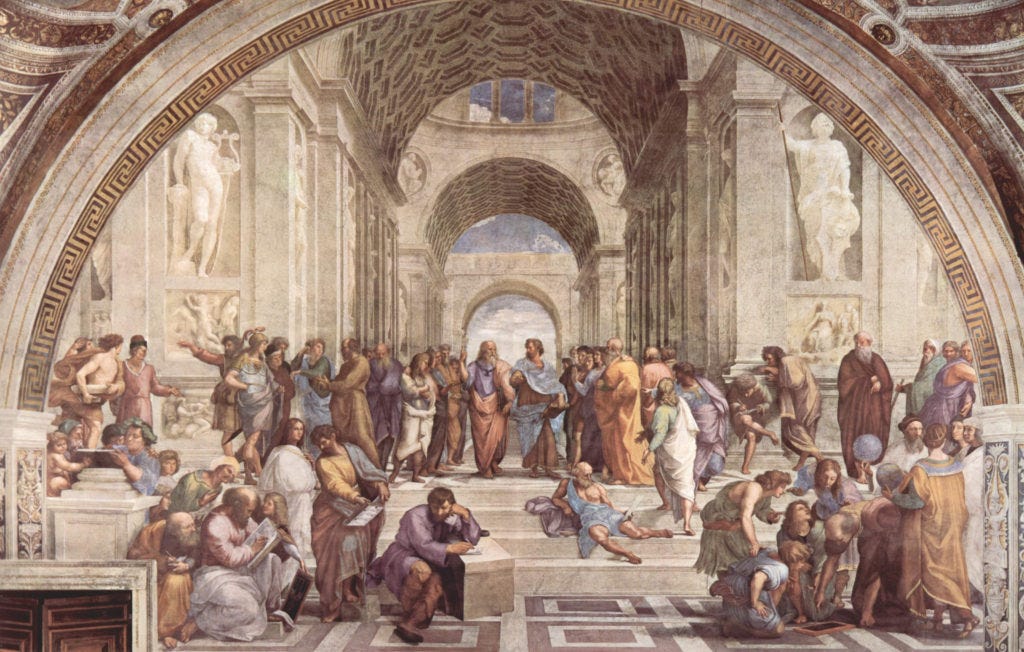Islam is Destroying the West
Liberty, Naivety, and the Looming Reckoning
Joseph Pearce recently observed that one of the more curious features of Western civilization is its tendency to invite its adversaries to dinner, seat them at the head of the table, and then act shocked when the silverware goes missing. That may be an uncharitable reading, but it is difficult to deny. The West, in its magnanimous embrace of religious liberty, has granted Islam the same standing it grants Judaism, Christianity, or even Buddhism. We have called it simply another religion, a faith that may sit comfortably alongside others in the broad tent of pluralism. That would be nice if Islam actually intended to reciprocate. The problem is that Islam does not. Islam has a stated telos, one articulated plainly in its sources: domination of the world under the rule of Allah, through the vehicle of Muhammad and his successors.
The Qur’an is undeniably blunt on this point. “It is He who sent His Messenger with guidance and the religion of truth to make it prevail over all religion” (Qur’an 9:33). The language is not subtle. Islam is not a private devotion or a personal spiritual path. It is a totalizing system. It is a legal code, a political project, and a military strategy wrapped in the garments of revelation. When the Qur’an instructs Muslims to “fight those who do not believe in Allah or in the Last Day” (Qur’an 9:29), it is not offering a metaphorical exhortation to engage in polite debate. It is establishing a duty of conquest. Sayyid Qutb, one of the most influential Islamist thinkers of the 20th century, echoed this with clarity: “Islam is not merely a belief, but a declaration of the absolute freedom of man from servitude to other men… This cannot be achieved unless both the political and economic dominations are destroyed” (Milestones, 1964). His idea of “freedom” was the abolition of all systems not ordered under sharia.
The pattern is clear. From Muhammad’s migration to Medina in 622, Islam shifted from an embattled religious minority to a movement of political conquest. In Mecca, Muhammad sought survival. In Medina, he pursued domination. He established treaties, broke them when opportune, subjugated rival tribes, and welded religious fervor to political authority. The precedent was set. Islam henceforth would not be content with tolerance or coexistence. It would aim at supremacy.
Western naivety in dealing with Islam is therefore not merely imprudent. It is suicidal. By granting Islam the privileges of Western liberty without demanding of it the corresponding commitment to Western ideals, we have set the stage for a slow and steady erosion of our civilization’s core. Consider the evidence. In Germany, mass immigration from predominantly Muslim countries has produced sharp spikes in violent crime, particularly against women. A 2018 study by the German government reported that more than 90 percent of the increase in violent crime in the state of Lower Saxony was attributable to newly arrived migrants, most from Islamic backgrounds. France has endured repeated waves of Islamist terrorism, from the Bataclan massacre in 2015 to the beheading of schoolteacher Samuel Paty in 2020. Sweden, once synonymous with Nordic tranquility, now has one of the highest rates of rape in Europe, with police data showing a disproportionate share of perpetrators are from immigrant backgrounds, heavily weighted toward Muslim-majority countries.
These are not isolated anecdotes. They are the natural result of importing a population whose cultural and religious commitments are, by design, antithetical to Western norms. Islam does not teach assimilation. It teaches supremacy. When Muslims reach sufficient numbers, the demand for accommodation follows. We see this in Britain, where sharia courts operate informally alongside English law, adjudicating family disputes in ways that contravene principles of gender equality. We see it in Belgium, where entire neighborhoods are effectively governed by Islamic norms, with local police hesitant to enforce national laws. Malaysia is a particularly sobering case study. When the British departed, they left behind a society with pluralist legal structures. Within a generation, sharia had been installed as a parallel system, with Muslims subject to its dictates even when these contradicted the civil law of the nation. This is not speculation. It is precedent.
The West, however, continues to act as if all religions are interchangeable units, each content to live and let live. But Islam’s conception of the good is not the Judeo-Christian conception of the good. It is not grounded in natural law or reasoned moral philosophy. It is whatever Allah has revealed through Muhammad. The Qur’an and Hadith are not merely texts to be studied or debated. They are marching orders. Al-Ghazali, one of the most prominent Muslim theologians of the medieval period, argued that philosophy and reason were to be subordinated to revelation. “The end of human reason is to acknowledge its own impotence and to submit,” he wrote in The Incoherence of the Philosophers. The Aristotelian tradition that flourished briefly in the Islamic Golden Age was eventually strangled. Averroes was exiled. Rational inquiry was deemed dangerous. Islam chose dogmatic authoritarianism over philosophical exploration. The West, in contrast, was shaped by the union of Athens, Jerusalem, and Rome: of reason and revelation, of natural law and divine law. That is why Western civilization could produce limited government, free enterprise, the scientific method, and the nuclear family as the cornerstone of society. Islam, by its very structure, cannot.
The irony is that the West, intoxicated by its own success, now presumes it can graft liberty onto anything and watch it bloom. This presumption fails to ask the obvious question: is Islam good for the West? The evidence suggests otherwise. Western civilization, at its best, is a delicate balance. It is liberty under law, ordered to the common good. It is faith that dignifies reason, and reason that purifies faith. It is speech that is free because truth is presumed to be real. It is the recognition that men and women are created in the image of God and thus capable of self-government. Islam contests each of these. Its vision of faith is submission, not freedom. Its law is comprehensive and leaves no space for individual conscience. Its speech is free only insofar as it praises Allah and his messenger. Its anthropology is one of hierarchy and subjugation, not equality in dignity.
The West has faced enemies before. Secularism seeks to reduce man to a consumer and the state to a nanny. Neo-Marxism seeks to dissolve family, property, and religion in a bath of revolutionary fervor. Islam seeks to enslave under the banner of Allah. Each is dangerous in its own right. But the peculiarity of Islam is that the West insists on treating it as if it were merely another flavor of religious devotion. It is not. It is a comprehensive political project dressed in religious garb. To treat it otherwise is folly.
The fruits of our folly are becoming evident. France now grapples with the reality that entire districts no longer function as part of the Republic. Germany struggles to reconcile its commitment to humanitarian openness with the social costs of unassimilated populations. Belgium and Sweden face similar dilemmas. The West’s refusal to demand assimilation is tantamount to cultural surrender. Liberty, speech, and enterprise only flourish when the people who enjoy them share a common telos. Without that shared purpose, liberty degenerates into license and license into chaos. Islam does not share that purpose. Its telos is its own supremacy.
One can, of course, object that many Muslims in the West live peaceably, that they seek only opportunity and stability. No doubt this is true for many individuals. But Islam is not merely the sum of its adherents. It is a civilization project. It has historically reshaped every society it has entered, from North Africa to South Asia. Why should Europe or North America expect to be exceptions? Western liberties do not transmute Islamic law into something else. They simply provide a hospitable environment for its eventual assertion.
The lesson is neither hysteria nor hatred but an awakening to reality. To preserve Western civilization, we must recover the courage to defend its foundations. That means recognizing that not all belief systems are equal. Some are corrosive to liberty. Some are hostile to reason. Some are antithetical to human dignity. Islam, taken on its own terms, is one of them. To pretend otherwise is to court ruin.
The West must therefore ask itself with honesty: do we want our children to inherit societies where free speech is curtailed, where religious liberty exists only under the shadow of sharia, where women’s safety is compromised, where the nuclear family is replaced by polygamy, and where innovation and ingenuity are stifled under legalism? If the answer is no, then accommodation is not the path forward. Renewal of Western civilization’s own telos is. Renewal in faith, in natural law, in the Judeo-Christian moral vision that undergirds liberty.
The hour is late, but not hopeless. The Church, if she has the courage to speak plainly, still offers the antidote. Christ alone dignifies reason without enslaving it, liberates without destroying, commands without degrading. The covenantal worldview of Christianity, centered on Jesus, gives what Islam never can: true freedom, ordered to truth, grounded in love. Western civilization was built on this foundation. Its survival depends on returning to it.









The Church and Western societies must boldly re-articulate the principles of natural law, human dignity, and the harmony of faith and reason. By renewing our Judeo-Christian roots, promoting prudent integration, engaging in honest dialogue, evangelizing boldly, advocating just policies, and fostering virtue, the Church can lead the West toward a future where liberty and truth flourish. As scripture teaches, we must speak “the truth in love” (Eph 4:15), confident that Christ’s covenantal vision remains the hope for civilization’s renewal.